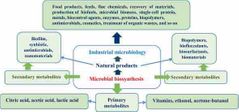![]()
![]()
![]()
Use LEFT and RIGHT arrow keys to navigate between flashcards;
Use UP and DOWN arrow keys to flip the card;
H to show hint;
A reads text to speech;
4 Cards in this Set
- Front
- Back
- 3rd side (hint)
|
Industrial Microbiology |
The use or utilization of microorganisms in the production of substances beneficial to mankind such as hormones (insulin), antibiotics (penicillin), single celled proteins (saccharomyces cerevisiae), biofilms. Other definitions of industrial microbiology. 1. The branch of microbiology in which microorganisms are used for the production of important substances such as antibiotics, amino acids, vaccines, enzymes, food products and fine chemicals. 2. Also synonymous to fermentation, as fermentation includes any process mediated or involving the use of microorganisms to attain a product of economic value. It is achieved for large scale use of microorganisms to synthesize products to commercial value and a wide variety of applications. |

|
|
|
Uses of industrial Microbiology (localized) |
*Conversion of grape to wine *Conversion of wine to vinegar. *Production of cheese *Production of ogi (pap). *Production of bread. *Production of cheese. *Production of other fermented products such as yoghurt. * The biodegradation of organic pollutions such as hydrocarbons. |
|
|
|
Uses of Industrial Microbiology (modern services) |
*Production of single celled proteins (saccharomyces cerevisiae also known as baker’s yeast). *Production of antibiotics (penicillin). *Production of interferons (a natural substance that helps the body fight against infections and other diseases, such as cancer). *Production of exopolysaccharides used for tertiary oil recovery. *Production of enzymes of industrial importance (lipase, analyse, grease lignin peroxidase, nitrite reductase). |
|
|
|
Microorganisms of importance in the industry. |
Microorganisms are used in industrial processes to produce substances that are of economic value. Industrial processes exploit the enzymatic activities of microorganisms in the production of substances of commercial value. Several biochemicals of commercial value are produced by the genetic engineering of microorganisms, and this enables greater yield, greater ease of recovery and purification. The essence of industrial processes is combining the right organism, an inexpensive substrate, and a proper environment to produce high yields of the desired fermentation product. In industrial microbiology, the term fermentation can be described as the chemical transformation of compounds carried out using microorganisms and their enzymes. In industrial fermentation, raw materials (substrate) are converted by microorganisms (specific strains of microbial enzymes) in a controlled, favourable environment (fermentor) to form a desired end product substance. Industrial microbiologists search for organisms whose metabolic compatibility can form substances of commercial importance. They try to find or create specific strains of microorganisms that will yield sufficient quantities of the desired products to permit commercial production on an economically favourable basis. These microbiologists must design the optimal production process. Microbial strain must retain their genetic and physiological features to produce high yield of compounds. Such strains are often genetically unstable. |
|

